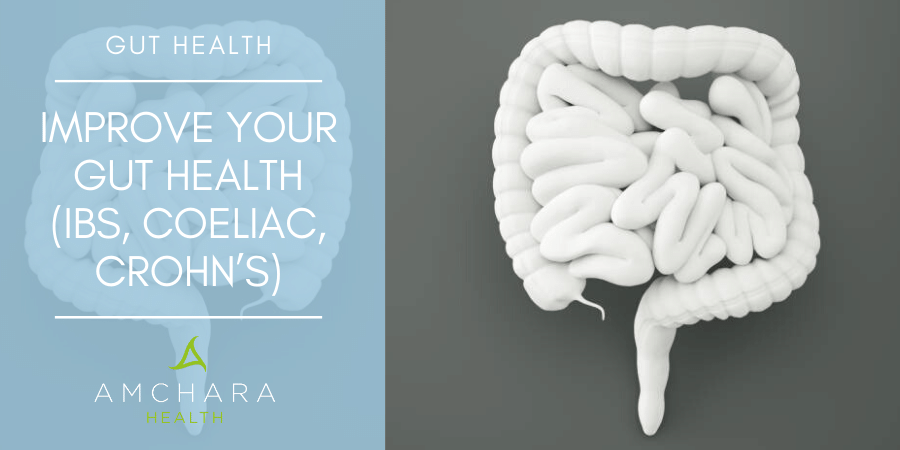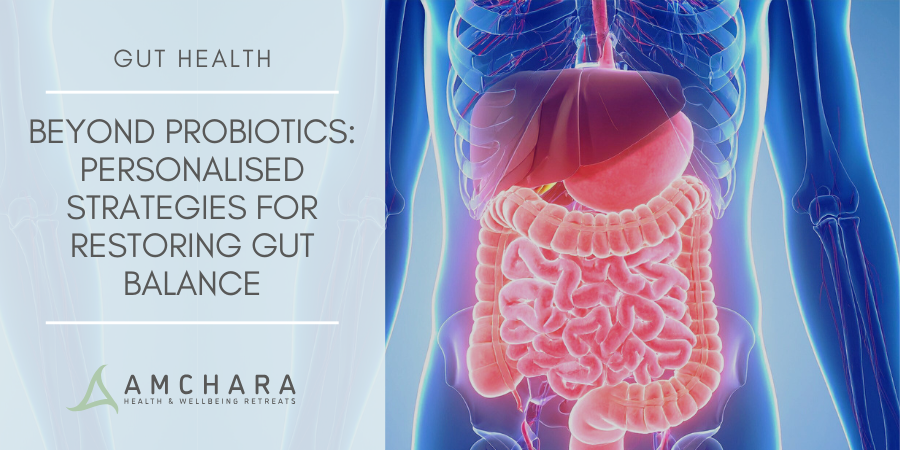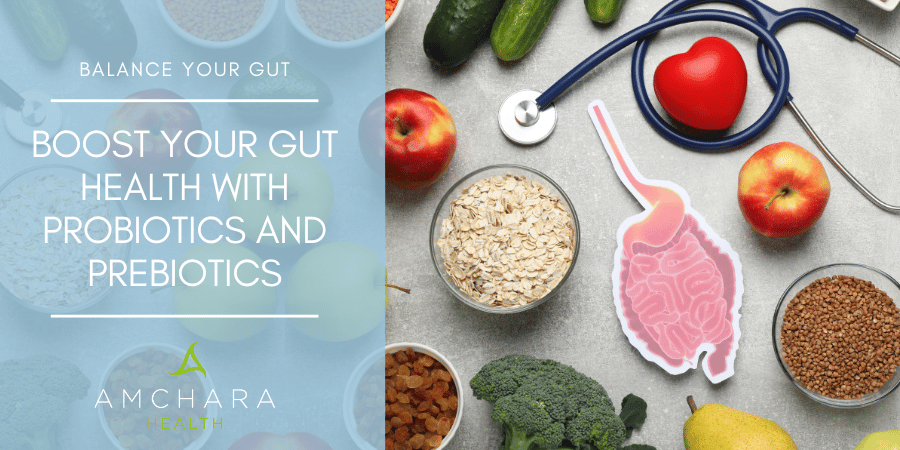40% of adults in the UK will report an IBS issue during their lifetime. IBS, coeliac disease and Crohn’s disease are specifically gut-related.
Your gut is vital for your overall health. Having a well-functioning digestive tract aids the absorption of nutrients – compromised gut health is thought to be at the root of many chronic diseases and health conditions.
5 Chronic health conditions
Influenced by gut health
#1 Irritable Bowel Syndrome (IBS)
IBS is a debilitating bowel disease that affects 1 in 5 people at some point in their lives. Symptoms can vary but often include persistent indigestion, cramping, irregular bowel movements, excessive gas, bloating and abdominal pain.
IBS is caused by an imbalance in the digestive tract. Improvement in stress, nutrition and other lifestyle factors can contribute to reducing and managing the symptoms.
#2 Inflammatory bowel diseases
Crohn’s and ulcerative colitis are two of the most common diseases that come under the umbrella of inflammatory bowel disease.
Crohn’s disease can affect the whole length of the gastrointestinal tract from mouth to anus, causing gut inflammation, abdominal pain, ulceration of the intestines and impaired nutrient absorption.
Ulcerative colitis affects just the large colon (bowel) but is characterised by inflammation and ulceration of the large bowel.
If Crohn’s Disease and ulcerative colitis are not well managed, necrotising and diseased parts of the intestine have to be removed due to complications of septicaemia (blood poisoning). The end result can be a permanent ileostomy or colostomy bag.
#3 Coeliac disease
This is an autoimmune disease, where the body incorrectly identifies gluten as the enemy: any food that contains gluten causes an immune reaction, resulting in inflammation in the gut. This leads to poor nutrient absorption, malnutrition, and can contribute to the development of disease and deficiencies in other areas of the body.
#4 Leaky gut syndrome
This occurs when the villi lining the small intestine have become too permeable. When healthy, the villi are semi-permeable to allow nutrients to be absorbed (assimilated). If the ‘glue’ that holds the villi together degrades due to dysbiosis and inflammation, larger molecules can penetrate the walls of the small intestine during the digestive process.
It is thought that these larger molecules can include viruses, bacteria, parasites and other endotoxic material that would normally be blocked. This stresses the immune system causing excessive inflammation that can lead to the development of chronic auto-immune conditions.
Whilst at present no scientific studies have proved that permeability of the gut, from leaky gut, has negative consequences to health, there is a strong correlation between several gut diseases and having a more permeable, or leaky, gut.
#5 Gut dysbiosis
This term refer to an imbalance in the gut flora and yeasts in the intestines, where the more pathogenic species of both have become dominant in the gut, resulting in poor
breakdown and digestion of food, lack of proper conversion of vitamins and hormones and impaired nutrient absorption. Symptoms include excessive intestinal gases, bloating, abdominal pain and irregular bowel movements.
The importance of your gut
Why a healthy gut is more important than you think
Your gut plays a myriad of important roles within your body and is vital to controlling your digestion and benefitting your immune system.
What are the benefits of good gut health?
⇒ Absorption
The bacteria in your gut are critical for assisting with digestion and optimum absorption of nutrients, so it’s essential to have a well-balanced gut flora.
A combination of optimally functioning digestive enzymes, good gut bacteria and a healthy intestinal lining ensures positive absorption of vital nutrients in the body.
⇒ Digestion
Good digestion allows your body to break down food into nutrients, which the body uses for cell repair, growth and energy. It also helps to rid your body of waste and protects you from harmful toxins.
Keeping your digestive system healthy is therefore essential to your future health and ability to prevent chronic disease.
⇒ Weight management
Your gut bacteria affects how different foods are digested which in turn influences your weight control. A healthy gut microbiome will effectively break down foods and determine how many nutrients and calories your body needs to absorb for optimum energy and
cell repair.
Certain intestinal microbes can also alter your sensitivity to insulin, the hormone that moves sugar from your blood, so that your body successfully burns fat it would have otherwise stored.
⇒ Positive Mood
Around 90% of serotonin receptors are found in your gut, and your gut’s microbiome produces more serotonin than your brain!
Along with influencing around 30 other neurotransmitters, your gut is believed to play an important role in influencing mood and happiness.
⇒ Preventing Disease
70-80% of your immune system is located in your digestive tract. This means that good gut health plays a very important role in the prevention of chronic health conditions, including autoimmune diseases as well as influencing the state of your mental health.
Improving gut health is a great starting point for addressing many common health conditions and helping to prevent the development of disease.
Improving your gut health
There are many ways to promote good gut health
4 key approaches to promote good gut health
#1 Probiotics
Probiotics, also known as ‘friendly’ bacteria, are bacteria that line your digestive tract and support your body’s ability to absorb nutrients and fight infection.
These ‘good’ bacteria are responsible for crowding out bad bacteria, yeast and fungi. Research has shown that probiotics can be helpful in the treatment of a number of gastrointestinal problems, in particular, IBS, as well as warding off infections and boosting your immune system.
#2 Stool analysis
Sometimes it may be necessary to obtain a sample of stool and send it off to a laboratory for analysis.
This is usually done to ascertain the presence of parasites in the gut, if ‘leaky’ gut is suspected, to check for inflammation in the gut, and to check the balance of the microbiome in the gut.
#3 De-stress
Emotional stress is often associated with IBS and problems in the gut. Many people suffer with emotional stress on a daily basis which can have a profound impact on overall health and wellbeing.
Working to understand your emotional triggers and evaluating your current lifestyle can work wonders for regaining balance and equilibrium in your body.
#4 Tailored nutrition
Tailored nutrition is a vital part of achieving optimal health. It is said that ‘we are what we eat’, more accurately, we are in fact what we absorb or assimilate.
We all have differences in how we absorb food and we all have different lifestyles. Tailoring nutrition to your unique physiology is important for improving health immediately and for improving long-term health outcomes.
A personalised approach tailored to you
Using a Personalised Health approach, we will work with you to understand your individual symptoms and health needs to ensure we provide the best environment to facilitate change in your gut health.
Together with support from our Personalised Health team, we can create your tailored nutrition plan and explore optional complementary therapies that will enhance your detox.
This will maximise your body’s ability to remove the ‘bad stuff’ and help to alleviate your symptoms, supporting in the prevention of future chronic disease.
The Personalised Health approach you will receive when joining us for a retreat aims to improve your gut health through a number of ways:
- Detoxification
- Intermittent fasting
- Nutritional therapy
- Colonic hydrotherapy
- Supplementation
- Comprehensive stool analysis
- Probiotics
- Psychological mentoring to develop healthy lifestyle habits
You are what you absorb!
Absorption is a key component for good gut health.
This is the process by which the nutrients in foods are passed on to the blood.
The majority of absorption occurs in the small intestine.
Absorption is made possible by the villi, the small bristle-like protrusions in the mucosa – the moist tissue lining certain parts of the body’s passages and organs.
The villi act as channels through which the nutrients derived from digested foods can pass into the bloodstream, whilst keeping most harmful materials out, and be carried to the rest of the body.
What are the common symptoms that indicate poor gut health?
What might surprise you is that if you are struggling with a chronic health condition including skin problems, headaches, hormone regulation, joint inflammation and other chronic conditions, your gut health might be playing a vital factor in this condition.
Your symptoms may often overlap, making it difficult to specifically diagnose the cause.
These can be commonly linked to diet, stress, food intolerance or allergy (such as to dairy and gluten), infections and reactions to prescribed medical drugs.
You may experience common symptoms of poor gut health including:
- Frequent digestive issues such as bloating, cramps, gas, acid reflux, constipation and diarrhoea
- Acne/skin rash
- Colds/common illnesses
- Low energy and fatigue
- Achy Joints
The next steps
The journey to balancing your Gut Health and revitalising your health can sometimes just be a few simple steps.
We can support you in one of two ways:








